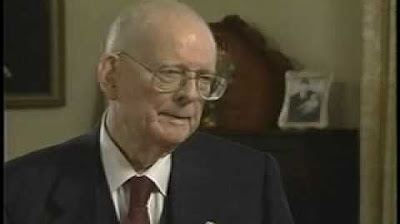What Really Causes Ulcers- The Fascinating Saga of Nobel Prize Winner Dr. Barry Marshall
Summary
TLDRIn the 1980s, Dr. Barry J. Marshall defied conventional medical beliefs by proving that peptic ulcers are caused by the bacteria Helicobacter pylori, not stress or stomach acid. Despite facing fierce opposition from the scientific community, Marshall's groundbreaking self-experiment, where he drank the bacteria to develop ulcers, ultimately led to a cure with antibiotics. His work revolutionized ulcer treatment, though it wasn't until the 1990s that the medical field fully accepted his findings. Marshall's perseverance earned him the Nobel Prize in 2005, highlighting the importance of challenging outdated scientific beliefs.
Takeaways
- 😀 Barry J. Marshall's work revolutionized the understanding of peptic ulcers and led to new treatments.
- 😀 Before Marshall's discovery, ulcers were thought to be caused by stress, spicy food, and excess stomach acid.
- 😀 Helicobacter pylori bacteria were found to be the real cause of ulcers, though this was controversial at first.
- 😀 Previous attempts to connect bacteria to ulcers were ignored, including work by Dr. A. Stone Freedberg and Dr. John Lykoudis.
- 😀 The scientific community resisted Marshall’s theory because they believed no bacteria could survive in the acidic stomach environment.
- 😀 Marshall personally tested his theory by ingesting Helicobacter pylori, causing himself to develop ulcers.
- 😀 Despite facing significant skepticism and professional opposition, Marshall’s research gained credibility as more patients were successfully treated.
- 😀 In 1994, the NIH officially acknowledged that Helicobacter pylori was the key to treating ulcers, endorsing Marshall’s findings.
- 😀 Marshall won the Nobel Prize in 2005 for his work on the cause and treatment of ulcers.
- 😀 Marshall’s experience highlights how scientific ideas can be met with resistance even when there is substantial evidence supporting them.
- 😀 The story of Marshall’s self-experimentation was first reported by a tabloid newspaper, which later led to funding and further research support.
Q & A
What was the commonly accepted cause of peptic ulcers before Barry J. Marshall's research?
-Before Barry J. Marshall's research, the medical community commonly believed that peptic ulcers were caused by stress, spicy food, and excess stomach acid.
What significant discovery did Dr. Robin Warren make regarding peptic ulcers?
-Dr. Robin Warren discovered that a bacterium, Helicobacter pylori, was present in the stomachs of patients suffering from peptic ulcers, which led to the eventual realization that this bacterium was responsible for the condition.
Why was Barry J. Marshall's theory about Helicobacter pylori causing ulcers initially dismissed by the medical community?
-Marshall's theory was dismissed because the prevailing belief was that no bacteria could survive in the highly acidic environment of the stomach, and the idea went against decades of established scientific consensus.
How did Barry J. Marshall prove his theory about the cause of ulcers?
-Marshall tested his hypothesis by drinking a glass containing Helicobacter pylori bacteria. He developed ulcers shortly afterward, providing direct evidence supporting his theory.
Why did Barry J. Marshall's wife object to his self-experiment?
-Marshall's wife objected because she was worried about his health and safety. Marshall admitted that it was easier to seek forgiveness than permission in this case.
What was the initial response of the medical community after Barry J. Marshall's self-experiment and publication of his results?
-Initially, Marshall faced significant criticism, with many in the medical community accusing him of pushing false treatments. However, over time, the effectiveness of his treatment in curing ulcers started to win over more professionals.
What was the pivotal moment that led to widespread acceptance of Marshall's theory?
-The pivotal moment came in 1994, when the National Institutes of Health (NIH) held a summit and officially declared that Helicobacter pylori detection and eradication was key to treating gastric and duodenal ulcers, thus validating Marshall's research.
How did the media initially respond to Marshall's self-experiment?
-The media initially responded in a sensational way, with the Star newspaper reporting on Marshall's self-experiment, which led to some initial public attention, though the story was initially treated with skepticism due to the tabloid’s reputation.
What was the outcome of the NIH summit in 1994 regarding Helicobacter pylori?
-The NIH summit in 1994 concluded that the detection and eradication of Helicobacter pylori was the key to treating duodenal and gastric ulcers, which helped shift the medical consensus in favor of Marshall's findings.
What long-term recognition did Barry J. Marshall receive for his work on Helicobacter pylori?
-Barry J. Marshall was awarded the Nobel Prize in Physiology or Medicine in 2005 for his groundbreaking work on Helicobacter pylori and its role in causing peptic ulcers, a recognition of the significant impact his research had on medical science.
Outlines

This section is available to paid users only. Please upgrade to access this part.
Upgrade NowMindmap

This section is available to paid users only. Please upgrade to access this part.
Upgrade NowKeywords

This section is available to paid users only. Please upgrade to access this part.
Upgrade NowHighlights

This section is available to paid users only. Please upgrade to access this part.
Upgrade NowTranscripts

This section is available to paid users only. Please upgrade to access this part.
Upgrade Now5.0 / 5 (0 votes)





